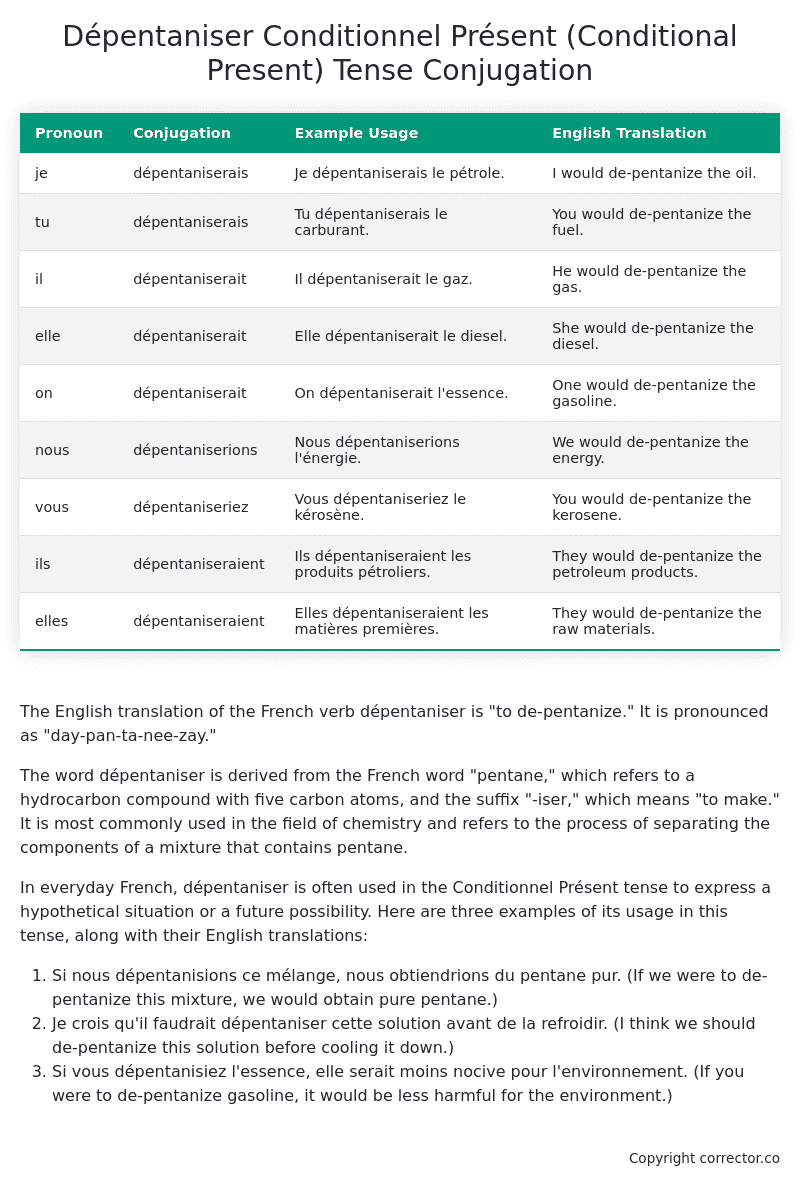Conditionnel Présent (Conditional Present) Tense Conjugation of the French Verb dépentaniser
Introduction to the verb dépentaniser
The English translation of the French verb dépentaniser is “to de-pentanize.” It is pronounced as “day-pan-ta-nee-zay.”
The word dépentaniser is derived from the French word “pentane,” which refers to a hydrocarbon compound with five carbon atoms, and the suffix “-iser,” which means “to make.” It is most commonly used in the field of chemistry and refers to the process of separating the components of a mixture that contains pentane.
In everyday French, dépentaniser is often used in the Conditionnel Présent tense to express a hypothetical situation or a future possibility. Here are three examples of its usage in this tense, along with their English translations:
- Si nous dépentanisions ce mélange, nous obtiendrions du pentane pur. (If we were to de-pentanize this mixture, we would obtain pure pentane.)
- Je crois qu’il faudrait dépentaniser cette solution avant de la refroidir. (I think we should de-pentanize this solution before cooling it down.)
- Si vous dépentanisiez l’essence, elle serait moins nocive pour l’environnement. (If you were to de-pentanize gasoline, it would be less harmful for the environment.)
Table of the Conditionnel Présent (Conditional Present) Tense Conjugation of dépentaniser
| Pronoun | Conjugation | Example Usage | English Translation |
|---|---|---|---|
| je | dépentaniserais | Je dépentaniserais le pétrole. | I would de-pentanize the oil. |
| tu | dépentaniserais | Tu dépentaniserais le carburant. | You would de-pentanize the fuel. |
| il | dépentaniserait | Il dépentaniserait le gaz. | He would de-pentanize the gas. |
| elle | dépentaniserait | Elle dépentaniserait le diesel. | She would de-pentanize the diesel. |
| on | dépentaniserait | On dépentaniserait l’essence. | One would de-pentanize the gasoline. |
| nous | dépentaniserions | Nous dépentaniserions l’énergie. | We would de-pentanize the energy. |
| vous | dépentaniseriez | Vous dépentaniseriez le kérosène. | You would de-pentanize the kerosene. |
| ils | dépentaniseraient | Ils dépentaniseraient les produits pétroliers. | They would de-pentanize the petroleum products. |
| elles | dépentaniseraient | Elles dépentaniseraient les matières premières. | They would de-pentanize the raw materials. |
Other Conjugations for Dépentaniser.
Le Present (Present Tense) Conjugation of the French Verb dépentaniser
Imparfait (Imperfect) Tense Conjugation of the French Verb dépentaniser
Passé Simple (Simple Past) Tense Conjugation of the French Verb dépentaniser
Passé Composé (Present Perfect) Tense Conjugation of the French Verb dépentaniser
Futur Simple (Simple Future) Tense Conjugation of the French Verb dépentaniser
Futur Proche (Near Future) Tense Conjugation of the French Verb dépentaniser
Plus-que-parfait (Pluperfect) Tense Conjugation of the French Verb dépentaniser
Passé Antérieur (Past Anterior) Tense Conjugation of the French Verb dépentaniser
Futur Antérieur (Future Anterior) Tense Conjugation of the French Verb dépentaniser
Subjonctif Présent (Subjunctive Present) Tense Conjugation of the French Verb dépentaniser
Subjonctif Passé (Subjunctive Past) Tense Conjugation of the French Verb dépentaniser
Subjonctif Imparfait (Subjunctive Imperfect) Tense Conjugation of the French Verb dépentaniser
Conditionnel Présent (Conditional Present) Tense Conjugation of the French Verb dépentaniser (this article)
Conditionnel Passé (Conditional Past) Tense Conjugation of the French Verb dépentaniser
L’impératif Présent (Imperative Present) Tense Conjugation of the French Verb dépentaniser
L’infinitif Présent (Infinitive Present) Tense Conjugation of the French Verb dépentaniser
Struggling with French verbs or the language in general? Why not use our free French Grammar Checker – no registration required!
Get a FREE Download Study Sheet of this Conjugation 🔥
Simply right click the image below, click “save image” and get your free reference for the dépentaniser Conditionnel Présent tense conjugation!

Dépentaniser – About the French Conditionnel Présent (Conditional Present) Tense
Formation
Common Everyday Usage Patterns
Expressing Polite Requests
Expressing Hypothetical Situations
Expressing Doubt or Uncertainty
Interactions with Other Tenses
Present Tense
Past Tense
Future Tense
Conditional Perfect
Summary
Want More?
I hope you enjoyed this article on the verb dépentaniser. Still in a learning mood? Check out another TOTALLY random French verb conjugation!


